The Northeast Cover Crops Council will host a fall webinar series. The webinars will take place from 12-1 pm on Wednesdays from October 1 to November 5, 2025. Click here to register for the series. [Read more…]
Rutgers to Host Afternoon Cover Crops Field Day – August 5
Rutgers Cover Crops Field Day
*The program may be rescheduled in the event of inclement weather*
Date: August 5, 2025
Time: 3:00PM to 6:00 PM
Where: Snyder Research Farm, 140 Locust Grove Rd, Pittstown, NJ 08867
REGISTRATION REQUIRED:
Please register by calling RCE of Sussex County: 973-948-3040
*First 20 registrants will receive a FREE copy of the USDA SARE book: “Managing Cover Crops Profitably”
This event will highlight several cover crop research projects and foster discussion and networking on drone use in agriculture and cover crop management.
Please join us for this summer event.
We will also discuss an upcoming drone pilot certification training we will be hosting this winter.
3:00 PM Registration and Welcome – Stephen Komar, ANR Agent /Rutgers SARE Coordinator
3:15 PM Go to the Field – Calibrating a Drone for Agricultural Applications – Adam Kyle, Warren Co. Com. College, Teaching Administrator, Precision Agriculture, Stephen Komar
4:00 PM Summer Cover Crop Planting Comparison: Drone vs. Drill – Bill Bamka, ANR Agent
4:30 PM Row Middle Cover Crops vs Herbicides for Weed Management in Vegetable Culture – Kate Brown, ANR Agent
RC&D Cover Crop Programs- Laura Tessieri, Executive Director, North Jersey RC&D
Drone Seeding Cover Crops into Pumpkins – Peter Nitzsche, ANR Agent
5:30 PM Update on Worker Protection Standards and Pesticide Recordkeeping – Michelle Infante-Casella, ANR Agent
6:00 PM Pesticide Credits and Adjourn
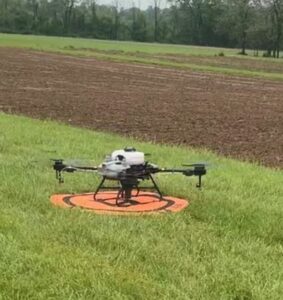
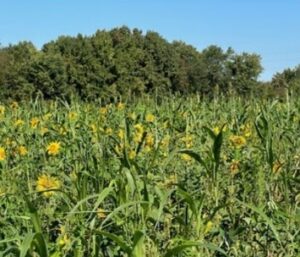
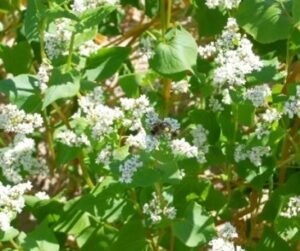
This event is sponsored by a grant awarded to Stephen Komar (Principal Investigator), Michelle Infante-Casella, and William Bamka Agricultural Agents/Professors, Rutgers Cooperative Extension, by the USDA, Sustainable Agriculture Research and Education, Professional Development Program.
What Can Summer Cover Crops Do for Soil Health and Future Crops?
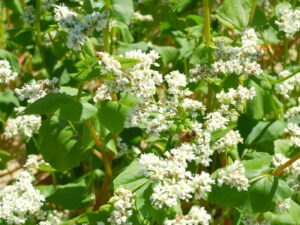 Now that some of our spring planted crops have finished, rather than leaving fields fallow or replanting fields that may have had some issues with plant diseases or insect pests, consider replanting with a summer cover crop. It is not too late to take advantage of summer cover crop benefits. What do summer cover crops do for soil health or future crop improvements? See below:
Now that some of our spring planted crops have finished, rather than leaving fields fallow or replanting fields that may have had some issues with plant diseases or insect pests, consider replanting with a summer cover crop. It is not too late to take advantage of summer cover crop benefits. What do summer cover crops do for soil health or future crop improvements? See below:
1. Increase Soil Organic Matter– One of the best attributes of having organic matter in the soil is improvement in soil structure. Adding organic matter improves tilth, water infiltration, water holding capacity, nutrient holding capacity and reduction of soil crusting. Also, as important is the increase in beneficial soil microbes and earthworms. Beneficial microbes can compete with pathogens and help release nutrients. Earthworms can cycle nutrients and improve pore spaces in the soil.
2. Reduce Soil Erosion – Just like with winter cover crops, summer cover crops can also reduce wind and water erosion in fields, especially those with slopes. During summer rainfall events, that can be significant if resulting from tropical storms, runoff may not just include soil loss, but also fertilizer and chemical movement. Therefore, keeping cover on a field during non-production times in any season is an excellent practice.
3. Nitrogen Cycling in the Soil – Nitrogen is often the most limiting nutrient for crop production, since it is so readily lost through nitrification and leaching. Storing nitrogen through plant cycling is an excellent way to improve fertility management. Whether it is a grass or non-leguminous cover crops N is still kept in the mix by the cover crop taking up residual N that would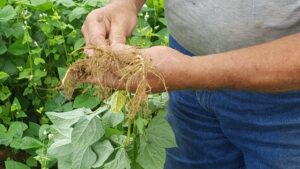 otherwise be lost. The cover crop plant takes up the nitrogen and after the crop is incorporated it decomposes, thus releasing the N for subsequent crops to use. If legume cover crops are planted, they have the ability to “fix” nitrogen from the atmosphere and through the same decomposition process will provide N for subsequent crops. Be sure to inoculate legume seed just prior to planting with Rhizobium bacteria in order to gain the maximum N fixation benefits.
otherwise be lost. The cover crop plant takes up the nitrogen and after the crop is incorporated it decomposes, thus releasing the N for subsequent crops to use. If legume cover crops are planted, they have the ability to “fix” nitrogen from the atmosphere and through the same decomposition process will provide N for subsequent crops. Be sure to inoculate legume seed just prior to planting with Rhizobium bacteria in order to gain the maximum N fixation benefits.
4. Reduce Weeds – When fields are left fallow after crops are harvested, weed growth can occur. If left to produce seeds, these weeds will multiply in subsequent crops. Therefore, managing the field by planting cover crops between cash crops is a great weed management option. As the cover crop grows, it will suppress the germination and growth of weeds through competition and shading. Some cover crop species can also suppress weeds biochemically, either while they are growing or while they are decomposing, which may prevent the germination or growth of other plants (allelopathy). Research has shown some cover crops like wheat, barley, oats, rye, sorghum, and sudangrass may suppress weeds. In some cases, it has also been reported that residues and leachates from crimson clover, hairy vetch, and other legumes have shown weed suppression.
5. Impacts on Plant Diseases – Cover crop residues could possibly be beneficial when it comes to plant pathogens, or can in some cases increase plant disease organisms. Some cover crop species are in the same plant families as cash crops and may be susceptible to the same disease organisms. Therefore, carrying the pathogen to the next crop. This is why paying attention to crop rotations is so important. In other cases, the cover crop residue can improve soil health in order to produce a better environment for beneficial microbes. By improving soil health, water infiltration, air pore space and other positive attributes, some soil pathogens may not survive as well, as in the case of water molds and water fungi. Some cover crops, like sorghum-sudangrass and sunnhemp, have been reported to reduce nematodes in soils. There are multiple positive factors from cover crops that can combat plant diseases.
6. Impacts on Insects – Like with plant diseases, cover crops can be susceptible to the same insect pests as cash crops. However, they may also attract beneficial insects into an area. Insect pests should be monitored in cover crops, just like in cash crops in order to not let populations get out of control and then move into nearby fields after the cover crop is killed.
For more resources on the us e of cover crops check out these resources: Cover Crops for Sustainable Crop Rotations – SARE
Upcoming Northeast Cover Crops Council Annual Conference

The Northeast Cover Crops Council (NECCC) annual conference will be held on Thursday, February 16, 2023 at the Holiday Inn By the Bay in Portland, Maine. The meeting is open to farmers, students, extension agents, crop consultants, and other agricultural professionals. Look forward to concurrent tracks covering a range of topics to include:
- Economics and financial opportunities of cover cropping
- Diversifying species and applications of cover crops
- Advanced cover cropping methods for vegetable systems
- The role of cover crops in climate change adaptation and mitigation
- Precision Sustainable Agriculture (PSA) project highlights
- And more!
Attendees will also be able to take part in a poster presentation where students, researchers, and agricultural professionals will share their research. Continuing education credits will be available for Certified Crop Advisors (CCAs).
Registration for the conference is $75 for farmers and students and $100 for all others. Financial support is available to eligible registrants. To see the full schedule and to RSVP, visit https://northeastcovercrops.com/event/northeast-cover-crops-council-annual-conference. Meals during the conference will be provided. Attendees are asked to RSVP online.
REMINDER – South Jersey Integrated Vegetable Crop Management Meeting Tonight
Just a quick reminder hoping to see you tonight. In addition to the announced agenda below, newly appointed State Executive Director of USDA’s Farm Service Agency Bob Andrzejczak will be joining us to (re)introduce himself to the farm community.
Integrated Vegetable Crop Management Twilight Meeting
THURSDAY, April 7, 2022
6:30 p.m. – 9:00 p.m.
East Vineland Fire Hall
4931 Landis Ave., Vineland, NJ
across from the Savoy Restaurant
(please park behind the building and enter conference room door in rear)
6:30 pm Tools for Pesticide Safety & Regulatory Compliance for Growers & Pesticide Handlers
- Pat Hastings, RCE Pesticide Education Program Coordinator
7:00 pm Understanding the New FSMA Water Rule
- Wes Kline, RCE Cumberland
7:20 pm Cover-crops for Fertility Management
- Michelle Infante-Casella, RCE Gloucester
7:40 pm Cover-crops and Other Weed Management Strategies for Plasticulture Crops
- Thierry Besancon, RCE Specialty Crop Weed Specialist
8:10 pm Disease Control Options for Spring Vegetable Crops
- Andy Wyenandt, RCE Vegetable Plant Pathologist
8:40 pm Pepper Weevil & Early Season Diamond Back Moth Management Options
- Joe Mahar, Vegetable IPM Coordinator
9:10 pm COVID-19 and New Roles for Extension Going Forward
- Rick VanVranken, RCE Atlantic
9:30 pm Adjourn
Pesticide Recertification Credits
Hope to see you there!
Sincerely,
Richard VanVranken, Agricultural Agent, Atlantic County
Wesley L. Kline, Agricultural Agent, Cumberland County
Michelle Infante-Casella, Agricultural Agent, Gloucester County
South Jersey Integrated Vegetable Crop Management Meeting April 7, 2022
Integrated Vegetable Crop Management Twilight Meeting
NOTE – change of date from earlier announcements
THURSDAY, April 7, 2022
6:30 p.m. – 9:00 p.m.
East Vineland Fire Hall
4931 Landis Ave., Vineland, NJ
across from the Savoy Restaurant
(please park behind the building and enter conference room door in rear)
6:30 pm Tools for Pesticide Safety & Regulatory Compliance for Growers & Pesticide Handlers
- Pat Hastings, RCE Pesticide Education Program Coordinator
7:00 pm Understanding the New FSMA Water Rule
- Wes Kline, RCE Cumberland
7:20 pm Cover-crops for Fertility Management
- Michelle Infante-Casella, RCE Gloucester
7:40 pm Cover-crops and Other Weed Management Strategies for Plasticulture Crops
- Thierry Besancon, RCE Specialty Crop Weed Specialist
8:10 pm Disease Control Options for Spring Vegetable Crops
- Andy Wyenandt, RCE Vegetable Plant Pathologist
8:40 pm Pepper Weevil & Early Season Diamond Back Moth Management Options
- Joe Mahar, Vegetable IPM Coordinator
9:10 pm COVID-19 and New Roles for Extension Going Forward
- Rick VanVranken, RCE Atlantic
9:30 pm Adjourn
Pesticide Recertification Credits
Hope to see you there!
Sincerely,
Richard VanVranken, Agricultural Agent, Atlantic County
Wesley L. Kline, Agricultural Agent, Cumberland County
Michelle Infante-Casella, Agricultural Agent, Gloucester County
